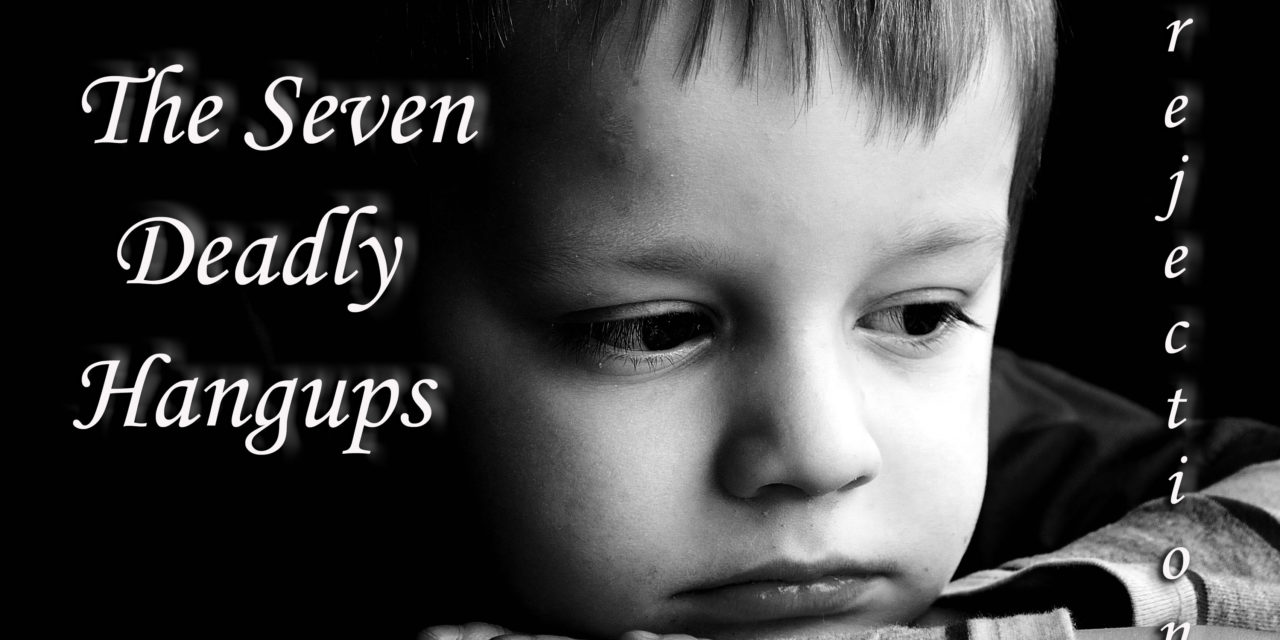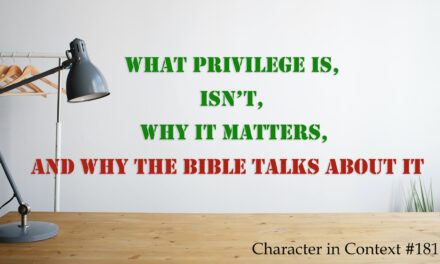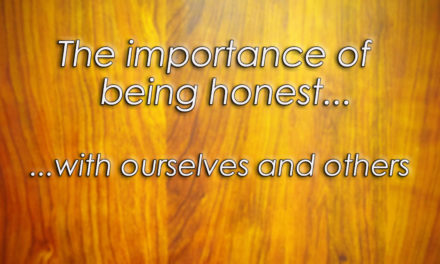This is the first of a series on the damaging mindsets that hold us back both in our personal lives as well as functionally within the Body of Messiah. There’s so much talk about the sin that holds us back, but what about our fruitless and sometimes fictional perceptions of this and that caused by abuse and sometimes by our own unreasonable expectations?
It sometimes seems as though the Western world suffers from a manufactured rejection crisis. Now, I am not denying that rejection exists, and often for some pretty nasty reasons, but oftentimes we feel rejection when we have, in fact, not been rejected at all. We just simply haven’t been given the preference that we feel we deserve and take personally when we do not receive it. Millennials, whom I feel are unfairly attacked for this, didn’t get this way because all the adults around them are well adjusted and reasonable, but instead because we tend to take stuff personally that is in no way personal. We want what we want and when we don’t get it we tend to assign blame instead of shrugging it off as part of life. Believe me, as a woman in a teaching ministry I have had to learn the difference between what is and is not personal and to stop trying to change what is beyond my ability to change.
I have suffered through rejection issues for most of my life and so I know how debilitating and heartbreaking the real thing is. However, I also know what it is to assume rejection when it simply isn’t there. You see, in order to actually be rejected, you have to rank high enough on a person’s radar that you even entered into their equation of whom to accept–otherwise, every time Facebook has a computer problem, you’ll be screaming persecution instead of checking the outage meter to find out if it is actually a worldwide problem or perhaps you’ll be sitting at home heartbroken when your friend simply chooses someone else to go shopping with for a change. I guess I could say that there is a big difference between the folks whom the popular cliques in High School bully and torment (that’s a prime example of real rejection) and the “unwashed masses” whom they simply ignore and who do not get invited to parties (which is not rejection). I have experience with being in both groups.
Let me give you an example.
If I was going to put on a conference, any of you who know me could probably guess whom I would invite to speak. I have my inner circle of teachers whom I not only trust to be responsible with their material but I also know to be drama-free and work well together with no one undercutting the others or encroaching on someone else’s allotted time or posturing or trying to be the main deal or only voice. There are also a whole bunch of teachers whom I would not even consider inviting–not because there is anything wrong with them but because they are not on my radar. I might even like their teachings, but they aren’t on my go-to list. Nor am I on theirs! They aren’t rejected by me, they just aren’t chosen by me (and vice versa). On the other hand–well, there are some teachers out there, and I use the term very loosely, that I wouldn’t even want to be in the same state with, much less invite them to my fictional conference. These people are flat out rejected by me because of their destructive behavior over the years.
We have these sorts of circles everywhere in life. Now, the same people I would invite to the conference to teach are not necessarily who I would invite over to my house to watch a certain kind of movie, or to go on a walk with me, or to go shopping, or to a family gathering. I still love and respect them, but I don’t have them in every single circle. Nor do they have me in every single circle! Nor should they! I don’t want to be invited over to watch the Superbowl–not since I saw the movie Concussion because all I want to do now is cry when I watch football. I don’t need to be invited to the wedding of an acquaintance’s son–or to the wedding of an acquaintance for that matter. If someone is holding a conference on the Book of Revelation and they invited me to speak, I would send them to my friends Ryan White and Dinah Dye instead–and I would wonder why on earth they invited me, frankly. Certainly not for my company because I am as awkward at social gatherings as a pimple on a supermodel’s nose.
But actual rejection is personal, it is intentional and requires a conscious choice. I was invariably chosen last for every sports team in school–but then, I was also so horrible at sports that it was probably wise on their part. Honestly, I wouldn’t have been quick to add the captain of the wrestling squad to the State Spelling Bee team either. Nothing personal, just different circles. And not rejection, because he was never being considered in the first place. Nor, I imagine, would he care to be.
Oftentimes, we assume rejection when we just aren’t on the radar for any of a multitude of reasons. If my friend is doing such and such and they ask me to come along, and then they do something entirely different and ask someone else–well, am I really being rejected or was I just not considered for that specific activity on that specific day? Was the person who wasn’t chosen for the first outing that I went on rejected? Do we define everything by the time we don’t get the privilege or should we always take into account the times we were chosen as weighing more heavily on the balance scales? I guess what I am saying is that not everything is about me. Most people, and even most people I know personally, aren’t weighing me into every decision so when they don’t tell me something or do something without me, or choose someone else over me–well, it probably isn’t personal. When we make everything personal, we become prisoners of every little perceived rejection as though people are either always accepting us or always rejecting us. In truth, we really don’t inhabit that big of a space in most people’s brains and sometimes not even those in our immediate family. When my husband goes hunting, I don’t even enter into his plans. I don’t want to enter into his plans. I will help slaughter whatever he brings home but he has more fun without me and I have more fun at home reading and playing sudoku. Is he rejecting me? Am I rejecting him? Nope.
And I also say this as the mom of a special needs child who really struggled in sports. Andrew wasn’t going to win anyone any games and as much as we like to think of everyone being included, not being included isn’t always about being rejected as a person. Sometimes people honestly look at what you can bring to the table in a group endeavor and make decisions based on pure numbers. We do it all the time and in everything. People who aren’t bright don’t go to the National Science Fair–people who go have to earn their place. Who screams persecution about that and gets any traction? I remember my son, at the age of thirteen, being absolutely crushed that he could never be in the military–but we handled it in such a way that he saw the wisdom of it and now as an adult he no longer takes it personally. He hates his limitations and knows they aren’t fair, but he also knows that there is more to life than demanding an entirely even playing field. He is not being personally rejected, and so his very understandable and appropriate disappointment isn’t turning to fruitless resentment.
We could say that it isn’t fair that some people just aren’t athletic, or artistic, or socially competent, or brilliant, or beautiful and point out that exclusion from certain things based on those criteria amounts to rejection–but it wouldn’t be accurate. I was never going to compete in a beauty pageant or get accepted to Julliard and I am certainly never going to be the life of the party. The people who are those things might get chosen for one thing or another based on qualifications, but those who don’t meet those qualifications, when they aren’t chosen–that isn’t the same thing as being rejected. It’s something we need to learn ourselves and start teaching our kids again. Some things really are personal–some because of the consequences of our own actions and some because people can be petty–but until we learn to take our offense out of the situation and honestly ask ourselves if this is really about us, we will never be able to see clearly or live free from inappropriate rejection issues.
That’s the deal in the secular world–what about rejection within the Body of Messiah? If someone really wants to be a teacher but did not receive that gifting, are they rejected by God or do they just have unreasonable expectations? If they feel as though they should be working miracles, or should be in local leadership, but aren’t–is that tantamount to rejection as well? Do we get to decide what we want to be doing or what we think we should be doing and judge God’s love and wisdom based on our sense of entitlement? Based on our own understandings and desires? Does anyone in life really have carte blanche and can they reasonably expect to get what they want?
I remember wanting to be an evangelist in the worst way (those of you who know me personally are facepalming and rolling your eyes right now). After expending countless hours in prayer, I had a dream one night where I was trying to get to the missions field only to watch a woman who wasn’t even trying but who, unlike me, was an ace with foreign languages get plucked up and chosen to go instead. And me? It was like I didn’t exist and as far as missions go–frankly, I just don’t exist. Not only am I not good with languages (actually, I am abysmal) but I am also just a disaster socially. I can’t read macro or micro-expressions so I don’t know if someone likes being with me or wants to throttle me. I am not so much rejected for missions as not even in the running! But I can teach and I can write. God chose me to do those things that a lot of other people want to do but can’t. They, in turn, can do other things and so might have been chosen for those.
Being chosen is not always the same thing as being accepted and not being chosen is not always about being rejected. Nebuchadnezzar was chosen to enact God’s wrath on Judah, but was he accepted by God? Saul was chosen as king, only to be rejected later. It’s a complicated issue. But until we accept those complexities and come to understand the big picture, we will always be crippled emotionally by even the faintest shadows of rejection that oftentimes exist only in our minds. Perhaps it’s our expectations that need to be rejected before we will realize that we aren’t nearly as universally rejected as we believe ourselves to be. And I have to tell you, from personal experience, that rejection issues destroy joy. Best to eradicate as many false perceptions as possible so that we can grow in the Fruit of the Spirit.
I have to say, here at the end, that many people have rejection issues because of family dynamics. Families with favorite children often have a rejected child as well. Parents who seek to control through disappointment while never acknowledging accomplishments leave their kids unprepared to not take every setback personally. Kids who live in an atmosphere where every transgression is met with over the top humiliation also are unequipped to discern the difference between rejection and just not being chosen. In fact, inappropriate humiliation is probably going to be our next topic as it is cruelly debilitating–but entirely conquerable.






















Best to eradicate as many false perceptions as possible so that we can grow in the Fruit of the Spirit.
Man, it’s like you spoke to the current lesson I’m having. That’s literally what I’m working on: identifying the perceptions I have that conflict with the character traits of Yah.
Very much appreciated. This series is helpful.